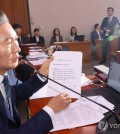- California Assembly OKs highest minimum wage in nation
- S. Korea unveils first graphic cigarette warnings
- US joins with South Korea, Japan in bid to deter North Korea
- LPGA golfer Chun In-gee finally back in action
- S. Korea won’t be top seed in final World Cup qualification round
- US men’s soccer misses 2nd straight Olympics
- US back on track in qualifying with 4-0 win over Guatemala
- High-intensity workout injuries spawn cottage industry
- CDC expands range of Zika mosquitoes into parts of Northeast
- Who knew? ‘The Walking Dead’ is helping families connect
Weak domestic demand constrains S. Korean economic recovery: KDI
The South Korean economy is on a recovery track on strong exports, but sagging domestic demand has limited the overall economic improvement, a state-run think tank said Wednesday.
“The Korean economy has sustained strong export growth, primarily fueled by the semiconductor sector. However, domestic demand remains subdued, constraining overall economic improvement,” the Korea Development Institute (KDI) said in a monthly economic assessment report.
The KDI has pointed to weak domestic demand since late last year.
In July, exports advanced 13.9 percent on-year to US$57.4 billion, the tenth straight monthly gain, as semiconductor sales jumped 50.4 percent to $11.2 billion.
Strong exports led to the output in the chip sector jumping 8.1 percent on-month in June, but the overall industrial production fell for the second consecutive month, according to government data.
Retail sales, a gauge of private spending, advanced 1 percent on-month due to growing demand for automobiles and other durable goods in June.
In on-year terms, however, retail sales fell 3.6 percent as a result of high inflation and high interest rates.
Facility investment climbed 4.3 percent from a month earlier in June, but it declined 2.7 percent on-year.
“Services production growth remained tepid, and construction investment continued its descent, indicating that the recovery phase of domestic demand has not yet materialized,” the report read.
The institute also said external uncertainties have “slightly increased” on the recent escalation of geopolitical risks in the Middle East and concerns over a U.S. economic recession.












